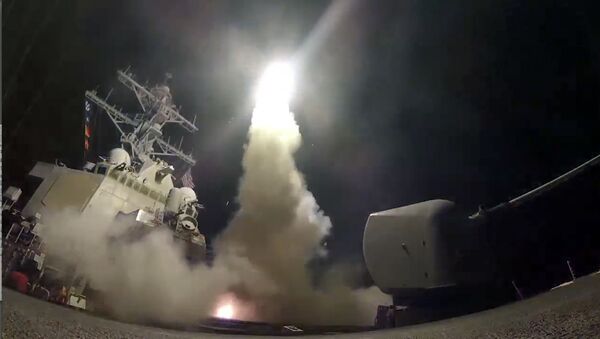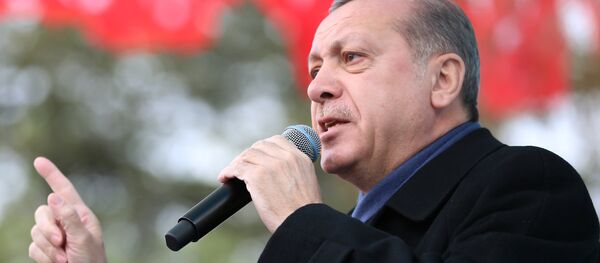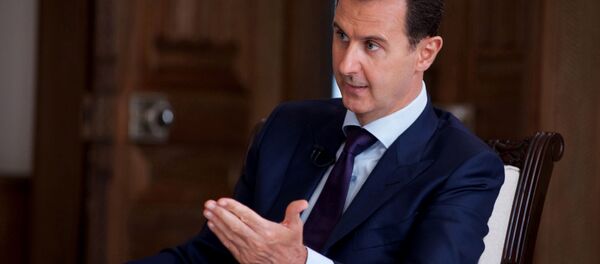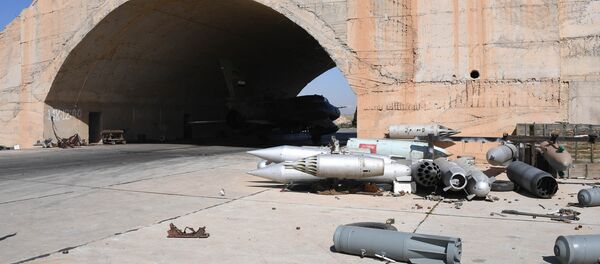Russian President Vladimir Putin described the attack as an "act of aggression against a sovereign state."
"President [Vladimir] Putin regards the US attacks on Syria as an aggression against a sovereign state in violation of the norms of international law, and under a trumped-up pretext at that," Kremlin spokesman Dmitry Peskov told journalists.
Putin also sees the latest US missile strikes on a military airfield in Syria as an attempt to distract from the mounting civilian casualties in Iraq, the Kremlin added.
The Kremlin also said that the attack in Syria was "de facto" in the interests of Daesh and other terrorist groups.
"The fact is that we no longer know what goals Washington pursued when deciding to carry out these strikes, but it is univocal that they were launched de facto in the interests of Daesh, al-Nusra Front and other terrorists. In this connection, we can only express regret," Peskov said.
US President Donald Trump said the attack was a response to the alleged chemical weapons used in Idlib on Tuesday, which Washington blames on Damascus.
However, a close look at the Idlib incident raises questions about the justifiability of the US missile attack.
On Tuesday, the Syrian National Coalition of Revolution and Opposition Forces (SNC) reported that some 80 people were killed and 200 others injured in a chemical weapons attack in Idlib. The opposition group blamed the Syrian army for the attack.
If the information is confirmed the incident will be the deadliest chemical attack since a chlorine attack in the Damascus suburb of Ghouta in August 2013 killed from several hundred to 1,500, according to different estimates.
Russia has also denied the allegations against the Bashar al-Assad government, calling for an objective investigation into the incident.
The Organization for the Prohibition of Chemical Weapons (OPCW) said that its Fact Finding Mission has begun the process of gathering and analyzing information from all available sources.
Despite the fact that no evidence has been provided on Damascus’s possible involvement, many Western governments were quick to blame al-Assad for the incident.
"We see that a number of Western countries, in particular the United States, already claim that this chemical attack was carried out by the forces of al-Assad. However, they do not provide any evidence," former Turkish Ambassador to the US Faruk Logoglu told Sputnik Turkey.
"My attitude toward Syria and Assad has changed very much. … You’re now talking about a whole different level," Trump commented on the incident.
Washington threatened with a response to the alleged chemical attack, and finally was quick to move beyond words to deeds.
However, the Thursday missile strike is not the first time the Pentagon has attacked positions of the Syrian Army.
On September 17, 2016, US-led coalition aircraft carried out four strikes against the Syrian army near the Deir ez-Zor airport, killing 62 soldiers and wounding some 100. The Pentagon said that the airstrike was a mistake and was intended to target Daesh militants, while a number of Syrian officials stated that the attack was intentional.
All of the above raises questions on what to expect in the future from the US military in Syria. It is to be hoped that what has happened twice will not happen a third time.
Meanwhile, speaking on condition of anonymity, a US defense official told Reuters on Friday that the missile strike was a "one-off," meaning that it was expected to be a single attack with no current plans for escalation.
Never miss a story again — sign up to our Telegram channel and we'll keep you up to speed!







